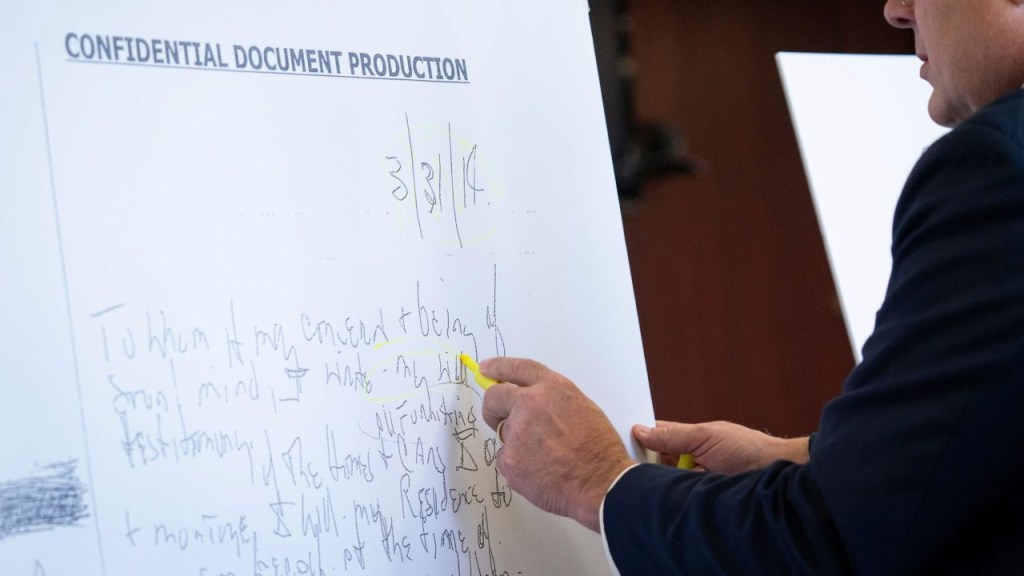(CNN) — A jury hearing arguments over the disposition of Aretha Franklin’s estate determined Tuesday that a 2014 version of her will should be retained as the record.
After deliberating for almost an hour, the jurors considered that the handwritten will, which Franklin’s niece found under a sofa cushion after the singer’s death, was signed by the music legend in 2014 and reads his will.

Aretha Franklin’s family in court this Tuesday. (Credit: Sarahbeth Maney/Detroit Free Press/USA Today Network)
At the center of the legal dispute were two separate wills.
Two of his sons, Kecalf Franklin and Edward Franklin, wanted the document dated March 31, 2014 to be established as their legal will, while another son, Ted White II, advocated keeping a 2010 document.
Franklin’s fourth son, Clarence Franklin, has special needs, is a ward of law and was not involved in the case.
Kecalf Franklin testified Monday that he believed the signature on the 2014 document was valid, not least because it contains the “signature” smiley face from Franklin’s signature.
Referring to the opening lines of the document, attorney Craig Smith, who represented Edward Franklin, said: “She’s speaking from the grave, folks: ‘This is my will.'”

Attorney Craig Smith shows an enlarged copy of a 2014 document during closing arguments in a trial over the estate of Aretha Franklin. (Credit: Sarahbeth Maney/Detroit Free Press/USA Today Network)
During the closing argument, Smith also referred to the copyrights derived from the iconic hits of the queen of soul.
“Now, we may all be dead from global warming, but if we’re close, my guess is they’ll be playing ‘Respect’ 300 years from now,” he said.
For his part, White’s attorney, Kurt Olson, argued that evidence showed the 2010 document was “intended” to be Franklin’s will because it was found in a closet where Franklin kept his “important documents.”
Franklin died in 2018 of cancer.
CNN’s Lisa Respers France and Cheri Mossberg contributed to this report
(CNN) — A jury hearing arguments over the disposition of Aretha Franklin’s estate determined Tuesday that a 2014 version of her will should be retained as the record.
After deliberating for almost an hour, the jurors considered that the handwritten will, which Franklin’s niece found under a sofa cushion after the singer’s death, was signed by the music legend in 2014 and reads his will.

Aretha Franklin’s family in court this Tuesday. (Credit: Sarahbeth Maney/Detroit Free Press/USA Today Network)
At the center of the legal dispute were two separate wills.
Two of his sons, Kecalf Franklin and Edward Franklin, wanted the document dated March 31, 2014 to be established as their legal will, while another son, Ted White II, advocated keeping a 2010 document.
Franklin’s fourth son, Clarence Franklin, has special needs, is a ward of law and was not involved in the case.
Kecalf Franklin testified Monday that he believed the signature on the 2014 document was valid, not least because it contains the “signature” smiley face from Franklin’s signature.
Referring to the opening lines of the document, attorney Craig Smith, who represented Edward Franklin, said: “She’s speaking from the grave, folks: ‘This is my will.'”

Attorney Craig Smith shows an enlarged copy of a 2014 document during closing arguments in a trial over the estate of Aretha Franklin. (Credit: Sarahbeth Maney/Detroit Free Press/USA Today Network)
During the closing argument, Smith also referred to the copyrights derived from the iconic hits of the queen of soul.
“Now, we may all be dead from global warming, but if we’re close, my guess is they’ll be playing ‘Respect’ 300 years from now,” he said.
For his part, White’s attorney, Kurt Olson, argued that evidence showed the 2010 document was “intended” to be Franklin’s will because it was found in a closet where Franklin kept his “important documents.”
Franklin died in 2018 of cancer.
CNN’s Lisa Respers France and Cheri Mossberg contributed to this report









